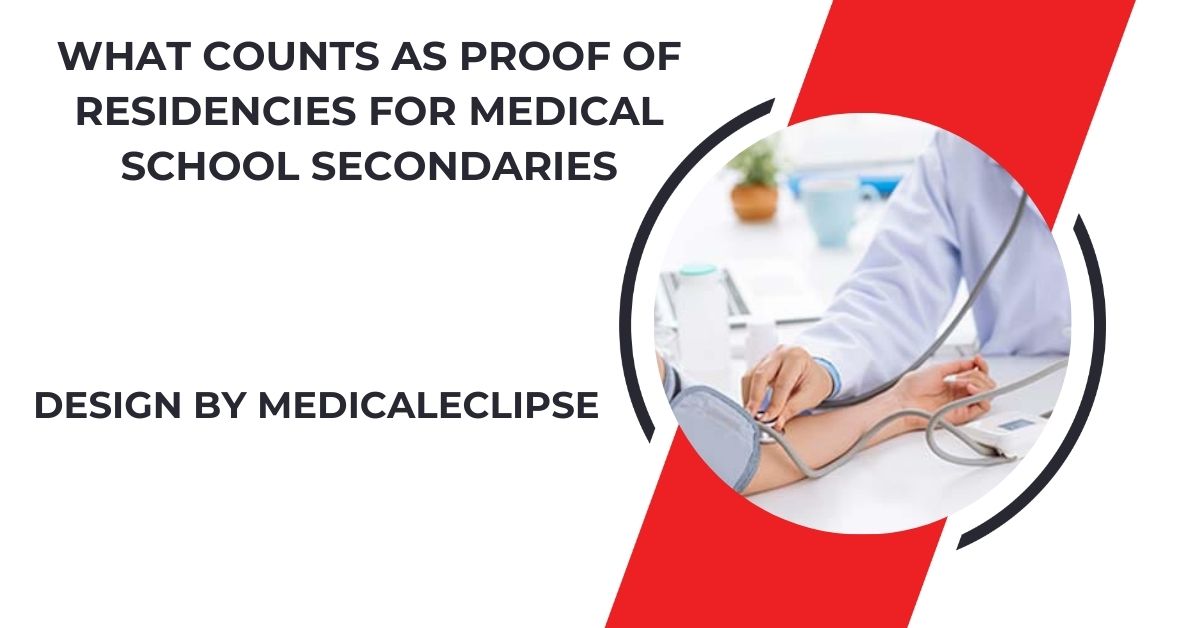Proof of residency is vital for medical school applications, especially for in-state tuition. Accepted documents include state IDs, voter registrations, tax returns, and utility bills.
This article explains what counts as proof of residency, why it matters, and how to ensure you have the correct documents to support your residency status.
What is Proof of Residency in Medical School Applications?

Proof of residency for medical school applications is a requirement that shows you are a resident of a particular state or region. This proof is vital in determining your eligibility for in-state tuition, as some medical schools give preference to in-state applicants. Additionally, it impacts scholarship eligibility, admission quotas, and residency placement after graduation.
Most states and schools define residency based on where you have lived and been involved for a certain period, often a year or more, before applying. Each medical school or state may have slightly different definitions, but the core idea is to establish that you live in the area and intend to stay there.
Why Medical Schools Require Proof of Residency:
Medical schools, particularly state-funded institutions, prioritize residents for a few reasons:
- Tuition Rates: Residents often pay lower tuition than out-of-state students.
- State Service Expectations: Many state schools aim to produce doctors who will stay and serve in the local community after graduation.
- Funding Allocation: Public medical schools often receive state funding, so their acceptance policies are influenced by their responsibility to train local healthcare providers.
Documents that Commonly Count as Proof of Residency:
Here are some of the most commonly accepted documents that can be used as proof of residency. It’s best to check with individual schools, as requirements may vary.
Driver’s License or State ID:
- Why it Works: Your driver’s license or state ID typically lists your address and the state where it was issued, proving residency.
- Considerations: To establish residency, your ID should be issued at least 12 months before your application. If you’ve recently moved, this may not suffice, and you may need additional documents.
Also Read: Charleston Area Medical Center Dept Of Medical Imaging – Advanced Imaging Services!
Voter Registration Card:
- Why it Works: Registering to vote in a specific state demonstrates commitment to that area, as you’re legally bound to vote within your registered precinct.
- Considerations: Ensure the registration date on the card aligns with residency requirements for your medical school applications.
Lease or Mortgage Agreement:
- Why it Works: A lease or mortgage agreement establishes a physical address and a fixed-term residence, which can substantiate your claim of living in a particular area.
- Considerations: Month-to-month leases may be less acceptable, so aim to provide a long-term lease (typically a year or longer) that shows an established presence in the state.
Utility Bills (Water, Gas, Electric):
- Why it Works: Utility bills with your name and address indicate your residency over time.
- Considerations: Schools usually ask for bills from the past 12 months to confirm sustained residency.
- Bills should ideally show usage over time and not just a single billing cycle.
State or Federal Tax Returns:

- Why it Works: Tax returns filed in a particular state demonstrate financial and legal ties, as you’re expected to file taxes in your state of residence.
- Considerations: Some schools may specifically request state tax returns, so be prepared to submit both state and federal returns if applicable.
Bank Statements or Employment Records:
- Why it Works: Bank statements listing your address, along with employment records from companies located within the state, can serve as secondary proof of residency.
- Considerations: These should align with other residency documents, as discrepancies might raise questions about your residency claim.
Vehicle Registration:
- Why it Works: Registering your vehicle in a specific state reinforces your ties to the area, as each state has unique registration requirements.
- Considerations: Like other documents, the registration should ideally be at least 12 months old to reflect long-term residency.
Insurance Statements (Health, Car):
- Why it Works: Insurance companies usually issue policies based on where you live, so these statements can substantiate your residency claim.
- Considerations: Statements should display your name and address consistently over time. Recent changes in location may raise red flags unless backed by a strong rationale.
Affidavit of Residency
- Why it Works: An affidavit of residency, often notarized, can serve as a sworn statement of residency for applicants who lack other forms of documentation.
- Considerations: This document is usually a last resort and may require additional signatures from local authorities to validate your residency claim.
How to Strengthen Your Proof of Residency:
Even with the right documents, ensuring they meet the medical school’s requirements is essential. Here are a few ways to strengthen your residency case:
- Ensure Consistency Across Documents: The information on your documents should be consistent (same address, matching dates) and clear in indicating your residence in that state.
- Avoid Recent Moves Before Application: Moving close to the application date can complicate your residency claim. Most states require that you live there for at least 12 months before applying.
- Maintain Continuous Residency: Gaps in your documentation (e.g., missing utility bills for a few months) may lead to questions. Ensure you can show sustained residency over time.
Common Mistakes to Avoid in Residency Proof:
- Using Outdated Documents: An old driver’s license or expired lease agreement won’t serve as convincing proof of current residency.
- Submitting Incomplete Paperwork: Make sure you have multiple, complementary documents to support your claim.
- Not Checking Specific School Requirements: Some schools have particular guidelines, so always verify the requirements before submitting any documents.
FAQ’s
- What is proof of residency for medical school applications?
Proof of residency confirms your status as a resident of a specific state, which is crucial for eligibility for in-state tuition and other benefits.
- What documents are commonly accepted as proof of residency?
Accepted documents include state IDs, voter registration cards, leases or mortgage agreements, utility bills, and tax returns.
- How long do I need to live in a state to establish residency?
Most medical schools require at least 12 months of residency before applying.
- What if I recently moved to a new state?
You may need additional documentation to support your residency claim if you’ve moved recently.
- How can I strengthen my proof of residency?
Ensure consistency across all documents, avoid recent moves before applying, and gather multiple forms of proof.
Conclusion
Providing proof of residency is essential for medical school applications, especially to qualify for in-state tuition or preference in state-funded programs. By gathering commonly accepted documents—like state IDs, voter registrations, tax returns, and leases—you can meet specific requirements. Preparing and verifying residency documents in advance strengthens your application, enhancing eligibility and demonstrating commitment to the state you wish to serve.

Leave a Reply